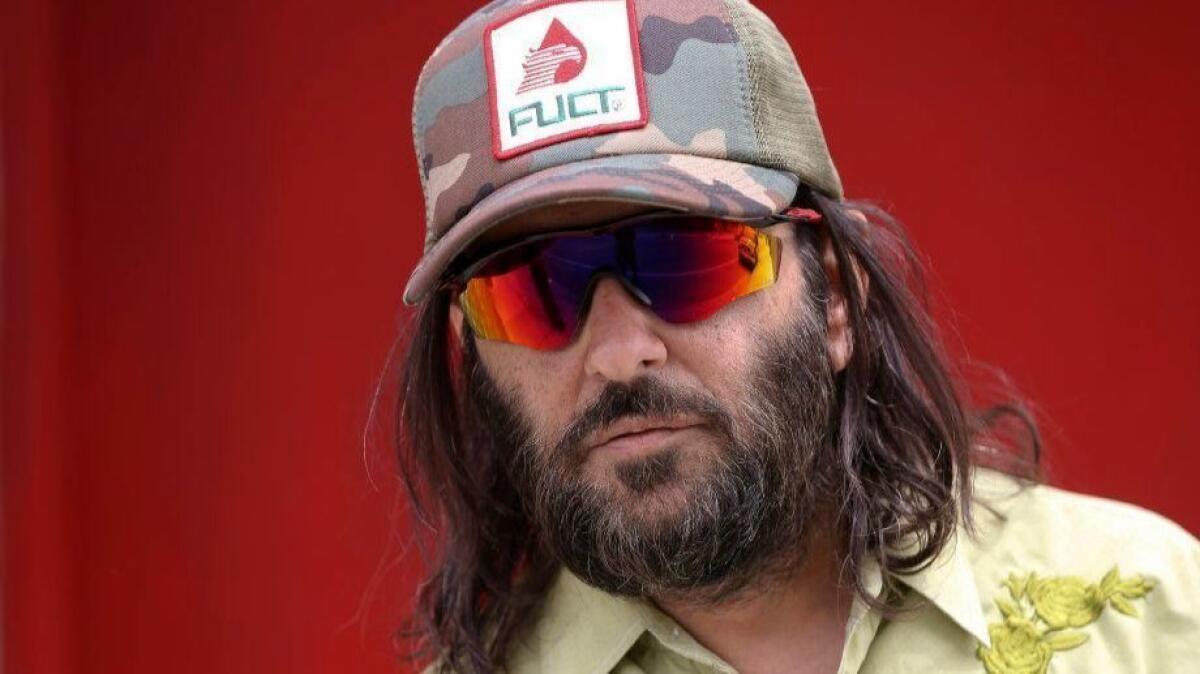Supreme Court rules L.A. clothing maker can trademark ‘scandalous’ brand name

The Supreme Court ruled Monday that a Los Angeles clothing maker had a free-speech right to win trademark protection for his FUCT brand.
The court by a 6-3 vote struck down part of the Lanham Act of 1946 that covers trademarks and said the government could not reject a brand name because it viewed the words or messages as “scandalous” or “immoral.”
“The most fundamental principle of free speech law is that the government can’t penalize or disfavor or discriminate against expression based on the ideas or viewpoints it conveys,” Justice Elena Kagan said for the court.
The ruling is a victory for Erik Brunetti, who has been selling his hats and T-shirts since 1991. And it continues a trend in which the high court looks skeptically at laws that act to regulate the freedom of expression.
John Sommer, the Irvine attorney who represented Brunetti, called it “a good day for Americans” and “a great day for free speech. The U.S. Supreme Court has taken the federal government out of the business of deciding questions of morality.”
He said the trademark office has used its authority to endorse favored messages while rejecting other views on the same issue.
Kagan cited some examples in her opinion. She said trademarks for beverages called Ko Kane and Marijuana Cola were rejected because they would “glamorize drug abuse,” while anti-drug messages like “Say no to drugs — Reality is the best trip in life” were approved. A wine called “Madonna” was rejected because it might offend “individuals of the Christian faith” while marks such as “Praise the Lord” for a game and “Jesus died for you” on clothing were approved, she said.
Sommer said Brunetti created his four-letter brand to stand for Friends U Can’t Trust, and used it to “express skepticism of authority figures.” He applied to register his trademark in 2011 and sued after being turned down by the U.S. Patent and Trademark Office.
Two years ago, his claim got a boost when the high court ruled for an Asian band that called itself the Slants and struck down the part of the trademark law that prohibited the use of “disparaging” words. In Matal vs. Tam, the justices said then they were troubled with trademark examiners having too much leeway over which words were acceptable or not.
Based on the ruling in the Slants case, a federal appeals court ruled for Brunetti last year and said the ban on “scandalous” words violated the 1st Amendment.
The Justice Department appealed the case of Iancu vs. Brunetti. During the oral argument, the justices sounded conflicted over whether the government must give official protection to a four-letter word as a brand.
Despite Monday’s ruling, it is not clear how the court will judge a trademark that uses profanity.
In Monday’s decision, all nine justices agreed the government could not reject a trademark for the FUCT brand because it was “immoral,” and six agreed the “scandalous” provision was unconstitutional as well.
Chief Justice John G. Roberts Jr. and Justices Sonia Sotomayor and Stephen G. Breyer wrote separately to say they would uphold restrictions on trademarks that are “obscene, vulgar or profane.”
Sotomayor said the decision “will beget unfortunate results.” She predicted a “coming rush” of people seeking to “register marks containing the most vulgar, profane or obscene words and images imaginable.” She said the court should have made clear that the ban on “scandalous” marks should be read to bar obscene and vulgar words.
Roberts said this was an unusual free-speech claim because the government was not restricting what Brunetti could say or advertise. “No speech is restricted; no one is being punished. The owners of such marks are merely denied certain additional benefits associated with federal trademark registration,” he wrote. “The 1st Amendment protects the freedom of speech; it does not require the government to give aid and comfort to those using obscene, vulgar and profane modes of expression.”
Lawyers who specialize in trademarks and free speech claims said the ruling might encourage more edgy or crude brand names, but they also said the marketplace would probably impose a kind of regulation.
“After a while, the novelty will wear off, and people might be offended. So I think the market will impose some caution on trademarks,” Los Angeles lawyer Doug Mirell said.
More stories from David G. Savage »
More to Read
Get the L.A. Times Politics newsletter
Deeply reported insights into legislation, politics and policy from Sacramento, Washington and beyond. In your inbox three times per week.
You may occasionally receive promotional content from the Los Angeles Times.







